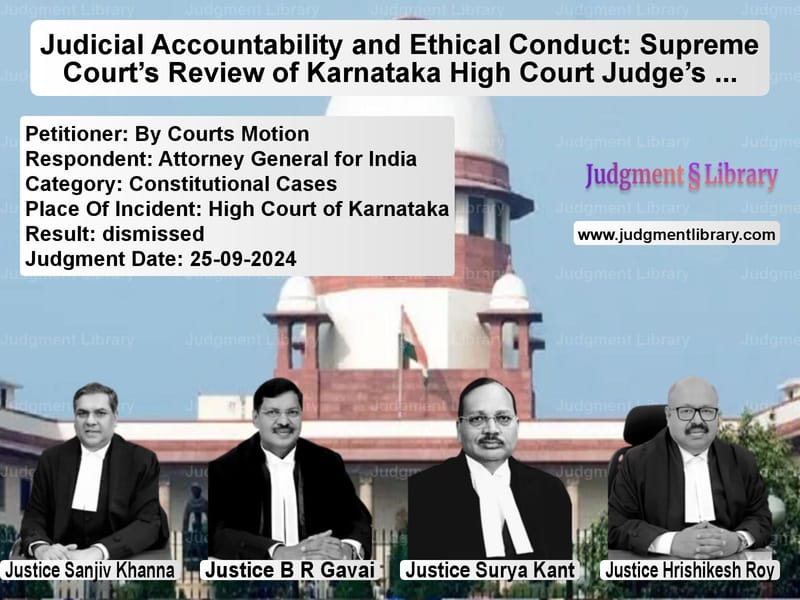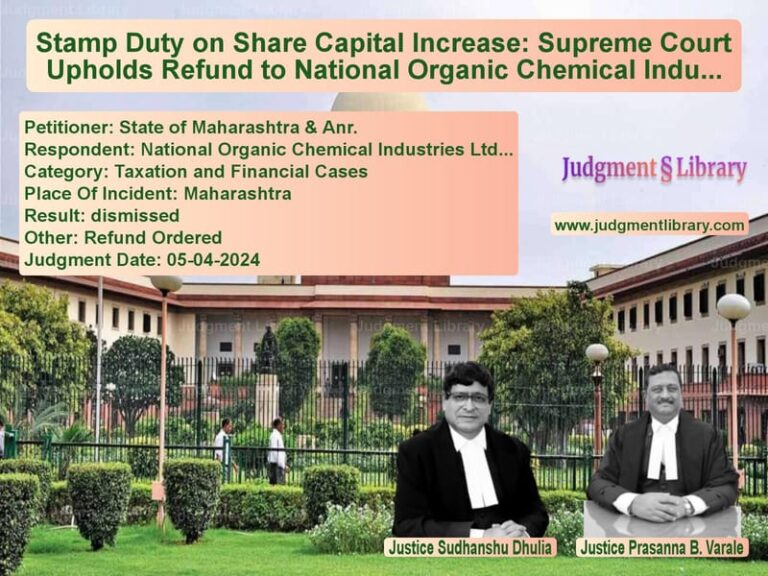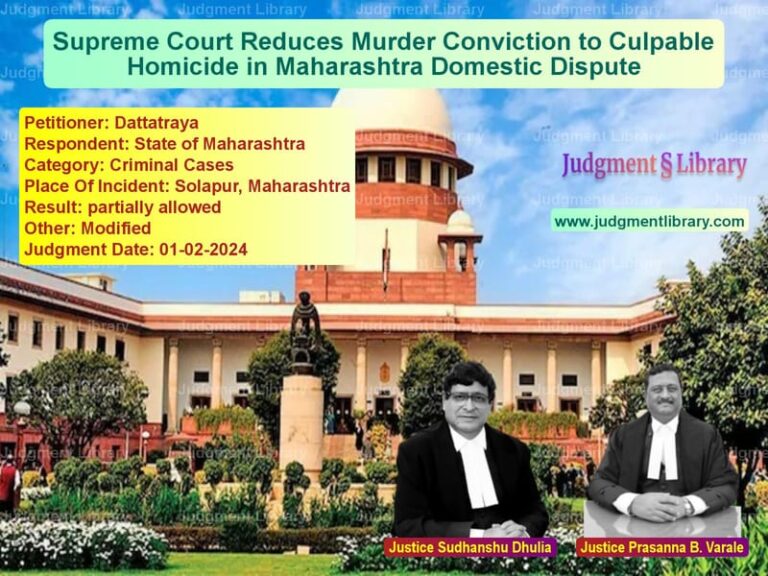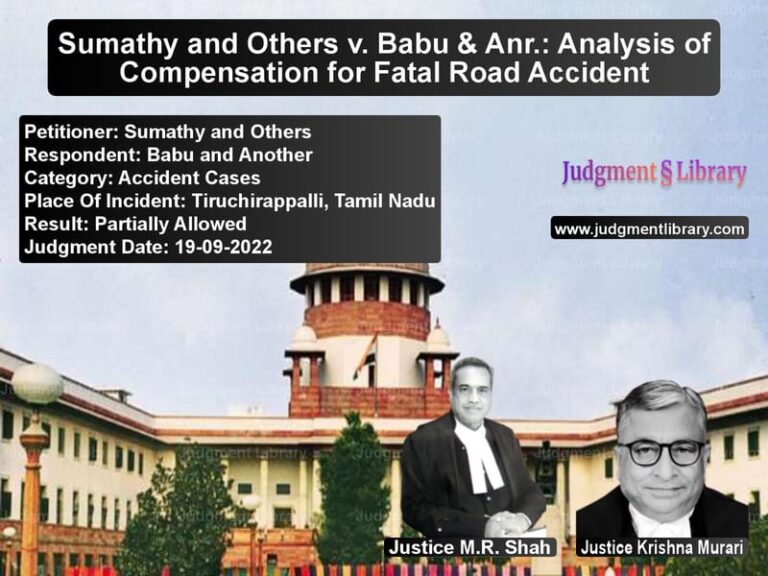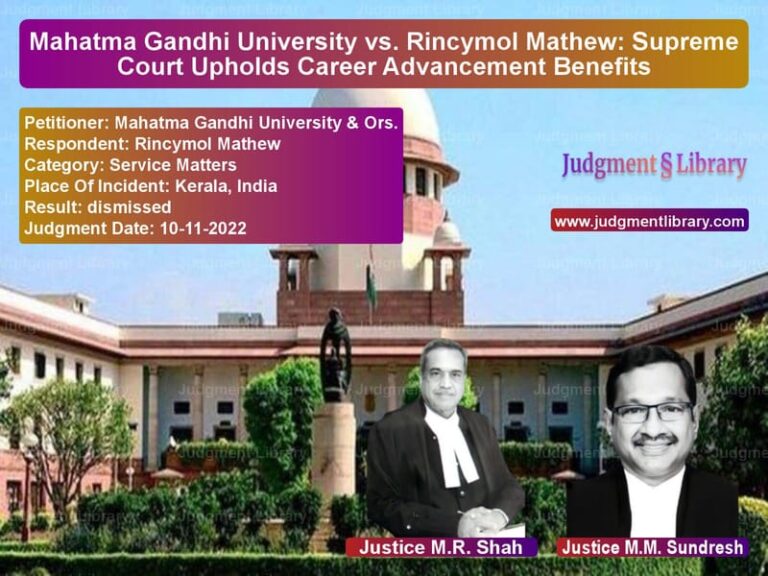Judicial Accountability and Ethical Conduct: Supreme Court’s Review of Karnataka High Court Judge’s Remarks
The Supreme Court of India recently took suo motu cognizance of controversial remarks made by Justice V. Srishananda of the Karnataka High Court during judicial proceedings. This case has brought into focus the responsibilities of judges, the role of live-streaming in courtrooms, and the broader implications of judicial accountability.
The matter gained national attention after excerpts from two court proceedings, held on 6 June 2024 and 28 August 2024, were widely circulated on social media. The Supreme Court, recognizing the gravity of the issue, initiated a suo motu proceeding to assess whether the comments were inappropriate and whether they had any implications for judicial ethics.
Background of the Case
Judges are expected to uphold the highest standards of integrity, impartiality, and judicial decorum. Any casual or inappropriate remark made by a judge can have far-reaching consequences, especially in today’s digital age where court proceedings are live-streamed and accessible to the public. This case highlighted the need for judges to be mindful of their words and behavior, given the widespread reach of court proceedings through online platforms.
The Karnataka High Court had adopted rules for live-streaming and recording of court proceedings under the Karnataka Rules on Live Streaming and Recording of Court Proceedings, 2021. As part of these regulations, proceedings in several High Court courtrooms, including those of Justice Srishananda, were live-streamed on the official YouTube channel of the High Court of Karnataka. The platform had over 1,38,000 subscribers, meaning that any remarks made in court had the potential to reach a large audience instantly.
Incident on 6 June 2024
During a hearing in Criminal Revision Petition No. 634 of 2021 in M.V. Krishnappa v. M. Srinivas, Justice Srishananda made remarks that later became a matter of controversy. The case involved a conviction under Section 138 of the Negotiable Instruments Act, wherein the accused had been sentenced to six months of simple imprisonment and a fine of Rs. 25,10,000. The petitioner sought to overturn the conviction and sentence.
During the proceedings, the following exchange took place:
Hon’ble Judge: Do you understand that…
Learned Advocate for the Respondent: It is admitted, My Lords…
Hon’ble Judge: Do you understand?
Learned Advocate for the Respondent: I understand that concept.
Hon’ble Judge: Where are the books of accounts? Give us. Are you an income tax assessee?
Learned Advocate for the Petitioner: Yes, he is an income tax assessee.
Hon’ble Judge: Wait, amma.
Learned Advocate for the Petitioner: Sorry, sir. Sorry, sorry, sorry, sir, sorry.
Hon’ble Judge: Why are you telling? You know everything about the opponent.
At this point, the learned advocate for the respondent attempted to intervene, but the judge continued:
Hon’ble Judge: If you are asked tomorrow morning, you will tell everything and you will also tell the color of the undergarment he wears.
This statement sparked significant public debate, as it was perceived as highly inappropriate and unbecoming of a judicial officer. The remark was widely circulated on social media, drawing sharp criticism from legal professionals and the public alike.
Incident on 28 August 2024
In another case, House Rent Revision Petition No. 28 of 2021, Justice Srishananda made further controversial remarks. The case concerned a rental dispute under the Karnataka Rent Act, and during the proceedings, the judge stated:
“The Mysore Road flyover, till up to the market from Gori Palya, is in Pakistan, not in India.”
This statement was seen as problematic due to its insinuation about a particular community. The remarks were once again captured in the live-stream and widely shared online, further intensifying the debate on judicial propriety and accountability.
Judicial Response and Apology
Following the Supreme Court’s suo motu notice, Justice Srishananda addressed the controversy in open court on 21 September 2024. In the presence of members of the Bengaluru Advocates Association, he stated:
“Few observations made by the court during the course of judicial proceedings are being quoted out of context in social media. Those observations of this Court are totally unintentional and not to hurt the feelings of any section of society. However, if any section of society or individual has been directly or indirectly hurt by the observations, with all sincerity, I regret the same.”
In light of this apology, the Supreme Court decided not to pursue further action against Justice Srishananda. However, the Court emphasized the necessity of judicial accountability and the importance of maintaining decorum in court proceedings.
Key Takeaways from the Supreme Court’s Judgment
- Judges must exercise caution in their speech and conduct, especially in an era where court proceedings are widely accessible through live-streaming.
- Casual remarks, particularly those perceived as inappropriate or biased, can undermine public confidence in the judiciary.
- The judiciary must be aware of the broader implications of its statements, as even offhand comments can be amplified by social media.
- The case underscores the importance of self-regulation and ethical conduct among judges to preserve the integrity of the legal system.
The Supreme Court concluded the proceedings with a strong reminder to the judiciary about the expectations placed on them in the digital age. The ruling serves as a precedent, reinforcing the importance of judicial responsibility in maintaining public trust.
Petitioner Name: By Courts Motion.Respondent Name: Attorney General for India.Judgment By: Justice Dhananjaya Y Chandrachud, Justice Sanjiv Khanna, Justice B R Gavai, Justice Surya Kant, Justice Hrishikesh Roy.Place Of Incident: High Court of Karnataka.Judgment Date: 25-09-2024.
Don’t miss out on the full details! Download the complete judgment in PDF format below and gain valuable insights instantly!
Download Judgment: by-courts-motion-vs-attorney-general-for-supreme-court-of-india-judgment-dated-25-09-2024.pdf
Directly Download Judgment: Directly download this Judgment
See all petitions in Fundamental Rights
See all petitions in Constitution Interpretation
See all petitions in Public Interest Litigation
See all petitions in Judgment by Dhananjaya Y Chandrachud
See all petitions in Judgment by Sanjiv Khanna
See all petitions in Judgment by B R Gavai
See all petitions in Judgment by Surya Kant
See all petitions in Judgment by Hrishikesh Roy
See all petitions in dismissed
See all petitions in supreme court of India judgments September 2024
See all petitions in 2024 judgments
See all posts in Constitutional Cases Category
See all allowed petitions in Constitutional Cases Category
See all Dismissed petitions in Constitutional Cases Category
See all partially allowed petitions in Constitutional Cases Category

